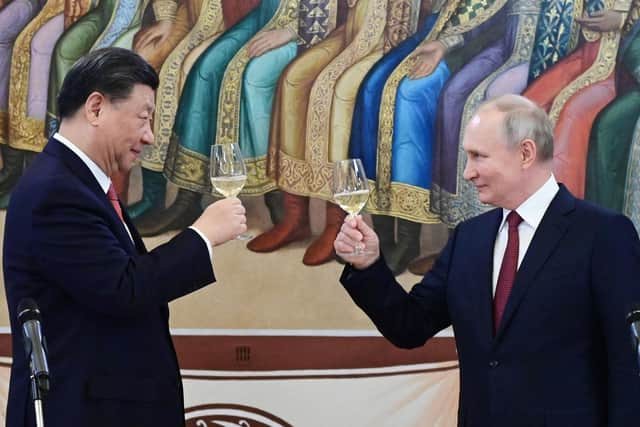Alliance between China and Russia is the most dangerous we’ve seen since the Second World War - Patrick Mercer
In 1991 our diplomacy failed dismally when the Soviet Union imploded. It was immediately clear that President Yeltsin was scrambling to find allies in the new order of world affairs and that was the West’s chance to draw a renascent Russia back into the fold of friendship which had led to the defeat of the Nazis in 1945. Certainly, the Cold War had fractured that friendship, but in July 1991 the Warsaw Pact was dissolved and Russia duly declared herself a ‘democracy’ - or her version of it. What possible point was there in the continuation of NATO, a confederacy designed specifically to counter a threat that had just disappeared?
Yet there was little rapprochement: perhaps the West needed a supposed bogeyman as a focus for their treaties and pacts. In any event, a tremulous hand of friendship that was extended by the new Russia was slapped away, NATO accepted more and more new members - many of them former statelets of the Soviet Union - and inched her new bases ever closer to Russia.
Advertisement
Hide AdAdvertisement
Hide AdAnd this, of course, is a central plank of President Putin’s current adventure in Ukraine. Russia swears blind that NATO agreed not to expand eastward - although there’s no firm evidence of such a promise - but Ukraine’s avowed intention of joining that alliance is always quoted by Moscow as a primary reason for the invasion in 2022.


Now China - a communist state, remember - has jumped plumb into the middle of all this. Whilst it’s very little talked about in the West, since 2009 Brazil, Russia, India, China and South Africa have been part of the BRICS trading group which comprises 41 per cent of the world’s population and which may allow five new members to join this year. Although BRICS is not yet a formal alliance, anyone who doubts Russia and China’s intentions towards each other need look no further than its very creation.
The crisis in Ukraine, though, has caused great tensions between Russia and China with the latter trying, not very successfully, to sit on the fence whilst buying sanctioned Russian energy and supplying vital weapon components. All the while Beijing has sniped at the USA over the Taiwan crisis unfolding, but never backed Moscow unquestioningly.
But, this is the first visit by President Xi since Russia invaded Ukraine, and it’s no fly by night schmooze. It was half a week of discussions - including four and a half hours of a one-to-one between the two Presidents - and a vast retinue of officials came along for the ride as well. That’s deeply significant, immediately giving the lie to the overused line in parts of the Western media that President Putin is an ‘international pariah’.
Advertisement
Hide AdAdvertisement
Hide AdAnd we shouldn’t neglect President’s Xi’s personal standing in all this. Again, it’s not often mentioned here, but he successfully mediated Iran and Saudi Arabia’s cooperation pact which paves the way for an end to the war in Yemen and is involved in the developing relationship between Iran and Bahrain.
Now Xi is in Moscow having already drawn up and published a rather vague peace plan for the war in Ukraine but hoping, no doubt, further to burnish his reputation as a statesman of renown. And President Xi’s in a strong position because Russia needs his country as a military ally whilst Ukraine does not want to alienate him.
President Zelensky needs to exploit Beijing’s potential as an investor, trading partner and potential middleman rather than push her away, and perhaps see China approving major exports of arms to Russia’s forces. Also, once the war has finished, China’s deep pockets are likely to be called upon to help Ukraine rebuild herself from a particularly devastating war.
Then, of course, there was the issue by the International Criminal Court of an arrest warrant for President Putin due to his alleged ‘unlawful deportation of children’. There’s no doubt that the minors have been removed from Ukraine and moved to Russia but, predictably, Moscow’s bloggers have erupted in self righteous fury demanding to know why parallel warrants have not been raised against President Zelensky. There are also those who might agree with the Guardian’s Russell Caplan who said, ‘Rather than being a beacon of international justice without favour or prejudice, it seems that (the ICC) prefers currying favour among its western sponsors and backers instead of casting the light of justice over the egregious… crimes against humanity that the US-led west has committed over the years.’
Advertisement
Hide AdAdvertisement
Hide AdThat’s all chaff, of course, but the timing of the Court’s action is interesting, coming, as it did, just on the verge of Xi’s arrival in Moscow. Had Beijing been deterred, President Putin’s pariah status would have been impossible to deny.
There’s no rewriting of the script and no point in speculating how matters would have developed had Russia been embraced by the West back in 1991 rather than rejected. One thing is certain though: hundreds of thousands of young Slavs are now dead thanks to a handful of blighted neocons whose actions have driven Russia into the arms of China and created a powerful and aggressive axis which, sooner or later will challenge our very existence.
Patrick Mercer is a former MP for Newark and Army colonel.